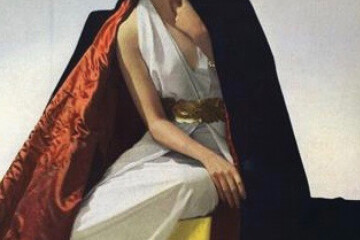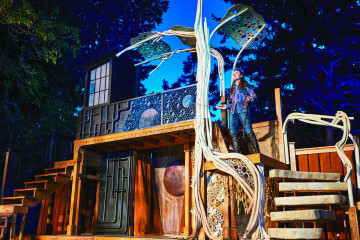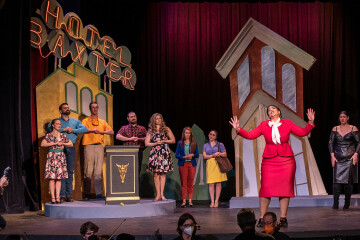The Montana Mikado
Gilbert and Sullivan Revised

Intermountain Opera of Bozeman presents The Montana Mikado, an adaptation of Gilbert and Sullivan’s The Mikado, at the Ellen Theatre, opening Friday, February 4th. The most famous creators of English Opera in the 19thCentury, W.S. Gilbert and Arthur Sullivan collaborated for over 20 years, creating fourteen shows. They wrote The Mikado, a comic opera, to poke fun at late 19th century British nobility and culture.
Afraid to be too direct (they were British, after all), they used Japan and Japanese culture as a foil, placing British society and culture in a comic Japanese setting. It was a time when racial prejudices were the norm, and few people understood that problem in Gilbert and Sullivan’s The Mikado. Using silly Japanese names for characters, stereotyping Japanese society, making mockeries of the Samurai culture, and parodying Japanese music, Gilbert and Sullivan played to the prejudices and biases of late 19th century western cultures with their production. By 2010, The Mikado had become one of the most popular operas in the world, and had been performed continuously for 125 years. Since Gilbert and Sullivan first presented the opera in 1885 at the Savoy Theatre in London, it has been highly unusual to set it any place other than in Japan. In recent years, the racism written into G&S’s The Mikado has presented difficulties for both performers and audiences.
Michael Sakir, Artistic Director of Intermountain Opera, points out that the opera world has been slow to reckon with the racism inherent in this production. In a position to do something about this, he, along with a supportive board, decided to commission a complete rewrite—an adaptation that removes the racism but retains the humor, the wit, the musicality and, quite simply, the genius of Gilbert and Sullivan in the basic storyline and plot.
Intermountain Opera commissioned Soren Kisiel as the librettist (one who writes the text / lyrics for an opera) for The Montana Mikado. Kisiel is co-founder of The Equinox Theatre (today’s Verge Theatre), Camp Equinox, and Broad Comedy. He is known for his comic genius and ability to write witty, satirical lines reminiscent of W.S. Gilbert. With the basic idea of staying true to G&S’s original concept of poking fun at British high culture, Kisiel wrote new lines satirizing modern-day Bozeman culture. It was a smart choice, as the quick-witted and satirical banter of Gilbert’s libretto translates easily into poking fun at ourselves and fellow Montanans. Bozeman theatregoers will laugh at themselves in the jokes, in the songs, and even in the costumes themselves, as it will all seem very familiar to us. To help accomplish the Bozeman foil, Kisiel chose typical Montana names for the show’s characters, coming up with names such as Dakota, Bridger, Mr. Meriwether, MacKenzie, Madison, and Mr. Noble, filled by the principals of five men and four women.
Costume designer Alayna Rasile comments about her approach to costuming and wardrobe, explaining that she “took the everyday style of our beloved mountain town and all of its character tropes and amplified them with solid bright colors, since Kisiel’s vision for the set and costumes is a cartoon-like version of Bozeman.” Originally from Montana, Rasile, spent a number of years in New York City working in the fashion and design industry before moving back to Bozeman several years ago. Her experience in those industries quickened her sense to the style, fashion, and different “looks” that are pervasive here, influenced by lifestyle, local culture, climate and, of course, the recent influx of development and money coming from out-of-state. Her costume design is based on observations of street style, and references various local social media character types. Music conductor Dean Williamson, born and raised in China, has changed some of the music from pentatonic scales (often used in Asian music) to more common western styles, while retaining the same melody lines. Williamson’s formative years in China have been very important in the development of The Montana Mikado. His knowledge and experience in both Asian life and music helped steer the adaptation away from cultural appropriation and towards a healthy understanding of the culture. Williamson is using a local orchestra of seventeen pieces, and a chorus of eight members.
Genevieve Trygstad-Burke, Operations Manager for Bozeman’s Intermountain Opera, speaks of how Intermountain Opera’s Montana Mikado is an important ground-breaking production in the operatic world; “Intermountain Opera is doing something important, necessary, and unique. It’s important to use the arts to make a real impact, above and beyond pure entertainment.”
The production has received favorable notice in the internationally renowned opera magazine Opera Today, bringing people from near and far to see the show. Trygstad-Burke observes that “people are coming to Bozeman specifically for the arts these days.” As an example, Opera critic Karyl Charna Lynn is traveling from London, England specifically to see this adaptation, an indication of the growing reputation of Bozeman’s Performing Arts scene.
Intermountain Opera has been producing operas and musicals since the spring of 1979, with its inaugural production of Verdi’s La Traviata. In his second year as Intermountain Opera’s Artistic Director, Sakir continues to build on what was begun 43 years ago. The excitement and ideas he brings to the company are substantial; he has already performed magic with last May’s Circle of Resilience production, which brought Native American composers and singers into cooperation with Intermountain Opera and Montana PBS in a stunning production on a local ranch.
Susan Miller was recently hired as Intermountain Opera’s new General Director; she brings a wealth of wonderful experience to the position, having toured with Montana Shakespeare in the Parks as an actress numerous times and working in the organization for eight years, helping to grow MSIP into the multi-state touring organization it is today. In addition to serving as Operations Manager for Intermountain Opera, Trygstad-Burke is co-founder of the popular Raison D’être Dance Project, and brings her expertise in promotions, marketing, and managing a successful artistic company to Intermountain Opera.
Several free special events were presented in advance of The Montana Mikado to help people understand not only the joys of The Mikado, but also to increase awareness of the biases, stereotypes, and discrimination Asian-Americans have historically experienced and continue to experience today.
“How Do You Solve a Problem Like Mikado?,” a five-part webinar series hosted by Dr. Sarah Allen on January 10, 17, 24, 31, & February 1 included guest appearances by Conductor Dean Williamson, Bozeman Symphony conductor Norman Huynh, and Montana Mikado guest artists Kimberly Sogioka and Kristen Choi. “Dis-Locating the Orient: The Mikado, Re-written for Contemporary Montana” was presented by Peter Tillack, Associate Professor of Japan Studies and Chair of Asian Studies Program at Montana State University on January 27. “Dis-Locating the Orient” explored the problematic side of Gilbert and Sullivan’s The Mikado—its aestheticized colonialist presumptions, its conflations of Japanese with other Asian cultures, and its casual racism.
Intermountain Opera is passionate about introducing community members to this unique art form, and offers an “Are you new to opera?” ticket discount. First-time attendees receive 25% off tickets, and students receive 50% off. The Opera’s website states: “Opera blends many artistic genres into one spectacular performing art. Our productions combine orchestral music, poetry, literature, visual art, lighting design, costume design, dance and, of course, the exquisite voices of our singers.” Visit www.intermountainopera.org to become acquainted with the magic of opera!
The Montana Mikado will be performed February 4th- 6th and 11th - 13th at the Ellen Theatre in downtown Bozeman. Friday and Saturday shows begin at 7:30 p.m.; Sunday shows start at 3 p.m.
“Socially-distanced Saturdays” will ensure ample space between your group and others. Please visit the website for more information and to purchase tickets, or call (406) 587-2889.



